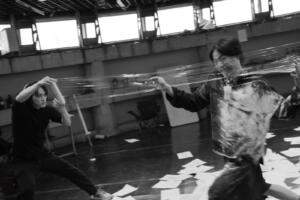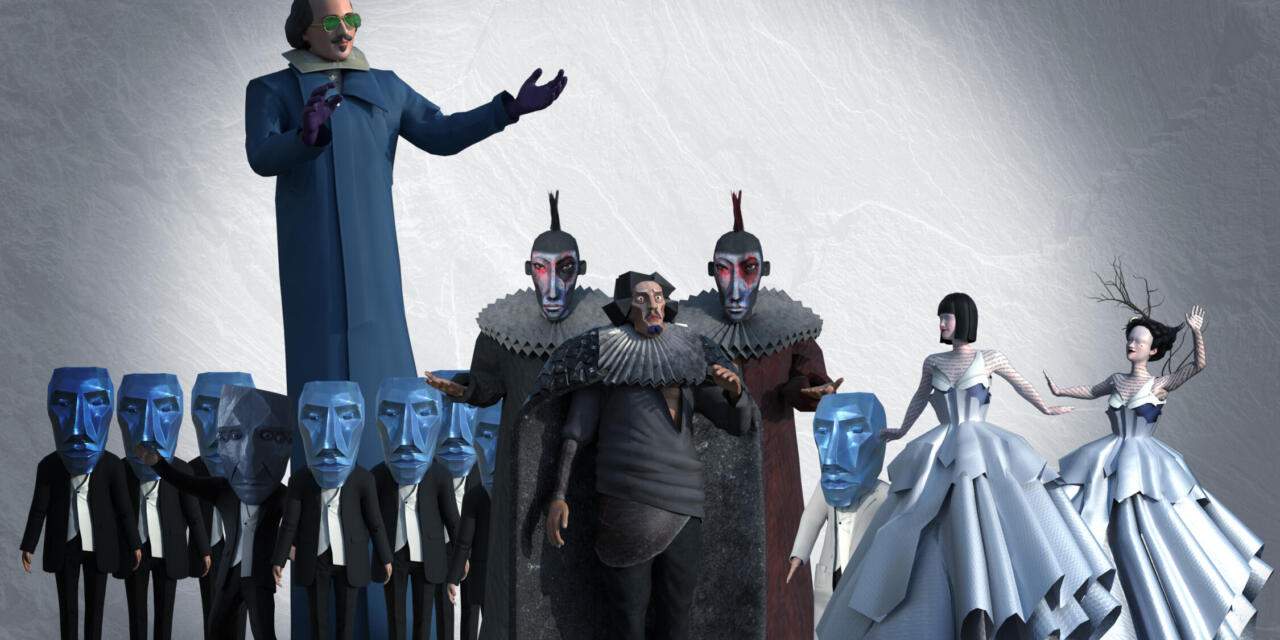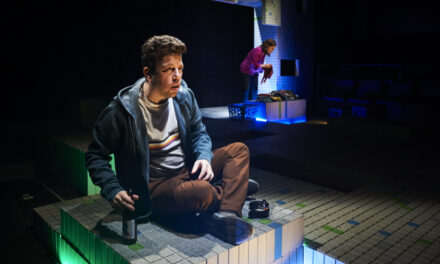Even though for the last decade there have been numerous attempts to unleash Chinese theatre’s potential due to the growing global discussion on technology interference with the arts and its aesthetics, distribution tools, and virtual capacity, the pandemic has already enhanced all these live-to-digital pursuits. As cross-field creativity and a hunger for innovation among China’s performing and visual artists’ community are constantly thriving, big tech companies are eagerly looking for fresh-minded contributors and opening their arms to the new market of responsive and tenacious theatergoers. Parallel to the emergence of the co-constructional universe that breaks boundaries between artistic/technical fields, real/virtual recognition and online/offline linkage, questions about decentralizing the Chinese cultural industry and strengthening ties with the technology sector have been raised.

The Sphinx Meta Theatre Festival, which claims itself to be “the world’s first metaverse theatre festival”, will be held from April 15 to May 7. It will be hosted by the China Federation of Literary and Art Circles (CFLAC) and organized by the Beijing Theatre Association (BTA) and the Beijing Young Dramatists Association. The festival program is under the tutelage of Meng Jinghui, one of the most prominent and renowned Chinese theatre directors. It will kick off with Meng’s premiere of Faust, which combines avant-garde aesthetics, digitally built characters’ staging, and VR technology. The festival is divided into eight sections, which names still remain slightly vague and make people wonder if they were designed only by man or rather generated within the prompt-engineering attempts, as the 83 futuristic posters presenting Sphinx Meta Theatre Festival were. The depository with human-AI generated posters, the festival schedule, and detailed performances or exhibitions programs are available on the festival’s WeChat account and have been updated frequently within the last few weeks. Visitors are required to spend a few minutes answering Sphinx’s questions. Those with an average grasp of how to decode instructions spitted out by the chatbot may finally get an identity, encroach the database and look forward to the extra content about the emergence of particular projects. The majority of those labeled as “Domestic Brilliant Performances” or “Art Interactive Dramas” includes works of experimental theatre artists, some of whom are Meng’s long-term collaborators or pupils, usually classified as the New Generation of Chinese Directors. To mention but a few, Li Jianjun, well-known for his documentary theatre hiring non-professional actors, is going to present World on a Wire – a story inspired by a 1973 German science fiction television serial about the uncontrollable computer simulation program, that tries to investigate the science-fiction means in contemporary, technology-dependent reality. Huang Xiangli, highly regarded for her role in the monodrama Letter from an Unknown Woman, which has been directed by Meng Jinghui, is going to present the performance inspired by Letter… and titled Embrace of an Unknown Woman. The play will be staged at the 798CUBE Art Museum in 798 Art Zone in Beijing and supported by VeeR, an immersive entertainment platform that produces VR 360-degree videos and experiences, so the audience is expected to be submerged in the big hug of Huang’s creation. Oedipus and the Mechanical Oracle is a premiere cross-disciplinary research project, led by the “young and genius” Chen Laoju. It uses tools derived from neuroscience and experimental cryptography in order to provide a deeper understanding of the Oedipus phenomenon through a theatrical lens. Many of the foreign paratheatrical projects included in the “International Horizontal and Vertical Theatre” section refer to the Time of Corona and reflect on either the necessity of real body presence in artist-to-artist or artist-to-viewer communication (Sebastian Kaiser’s “Artistic Intelligence Network”) or the concept of the new body that is beyond physical state and is being formed by actions, intentions and joint meditation (Peter Sellars’s “this body is so impermanent…”).

PC: The Sphinx Meta Theatre Festival.
Instead of the variety of 56 non-specific, metaverse-like performances, the festival makers declare wide geographical coverage. Linking Beijing, Shanghai, Guangzhou, Anaya, New York, Paris, and Berlin with artistic and technological threads, the Sphinx aims to build a new ecosystem for the global theatrical audience, detached from traditional venues, like institutional theatres. The tech industry’s support for the creators’ indomitable impetus likewise seems to be substantial. 17 domestic and foreign high-tech companies, basically VR, AR, MR, and metaverse services leaders and AI solutions providers (i.a. Xiao Bing, VeeR, Nreal, Bitsrealm, Beijing Nokov Science & Technology, rct AI, PICO, Deemos Technologies, Baidu “Xirang”), work at overcoming time and space limitations to assist the metaverse stage in achieving full agency. Concurrently, curators have already announced joint action with TheOne.art on releasing ten NFT blind boxes with exclusive digital collections and named the merch platform “Collection Wormhole Series”.

Meng Jinghui’s “Faust” rehearsal. PC: The Sphinx Meta Theatre Festival.
The immersive theatre movement continues to gain momentum in China and there is nothing new in staging art at shopping malls, city parks, or galleries there. However, incorporating illustrious artistic authorities into metaverse “b-entertainment” content, as declared, and seeking an audience far away from the amphitheater’s chairs, may completely change the objectives of the Chinese contemporary stage. After some significant manifestos on theatre which have responded to a multitude of live-to-digital changes (including an online theatre manifesto by Wang Chong), the Sphinx Meta Theatre Festival seems to be a very landmark in the last-decade accelerating process of decentralizing theatre and scattering its potential “wormholes”. After several years of inventing and improving distribution tools that can give theatre greater independence from unstable conditions, technological giants have already taken the reins. High-tech companies, usually associated with the environment of gamers and netizens, can possibly attract a new audience who until now have barely been interested in the performing arts. That certainly will benefit both artists and the tech industry, but the issue of elder generations who can hardly catch up with newfangled devices and may have no access to the metaverse playground remains unsolved. On the other hand, theatre spilling out of its elite venues is no longer “just to watch” art. As VR glasses, Web 3.0 or advanced software can be implemented into performance, room for freedom can occur. Nevertheless, it remains inscrutable how Chinese artists or engineers will use it and if the negotiating space is designable in advance or rather allows outer voices to resonate. Furthermore, involving big tech companies in the content-approving process radically changes theatre’s ever aspirations to set the complexity bar of the narrative high and teach the audience to pursue long and complicated plots. The scope of the audience’s active participation in performances imposes blurring the boundaries between professions as well, so raising an academic discussion on future stages can bear fruit. Apart from the fact that “the first-ever” caption on Chinese metaverse experimentation with culture can be also considered as a showing of strength within continental technological resources, the idea of establishing “the world’s first Meta-Art Academy” that is an interface providing one-pupil courses adjusted to personal needs and designed by means of MR toolset, seems to be crucial.
Although the Sphinx Meta Theatre Festival is yet to come and may sound indistinct and even virtual, regarded as the oracle on future stage, it’s worth drawing attention to.
This post was written by the author in their personal capacity.The opinions expressed in this article are the author’s own and do not reflect the view of The Theatre Times, their staff or collaborators.
This post was written by Anna Gryszkiewicz.
The views expressed here belong to the author and do not necessarily reflect our views and opinions.


















